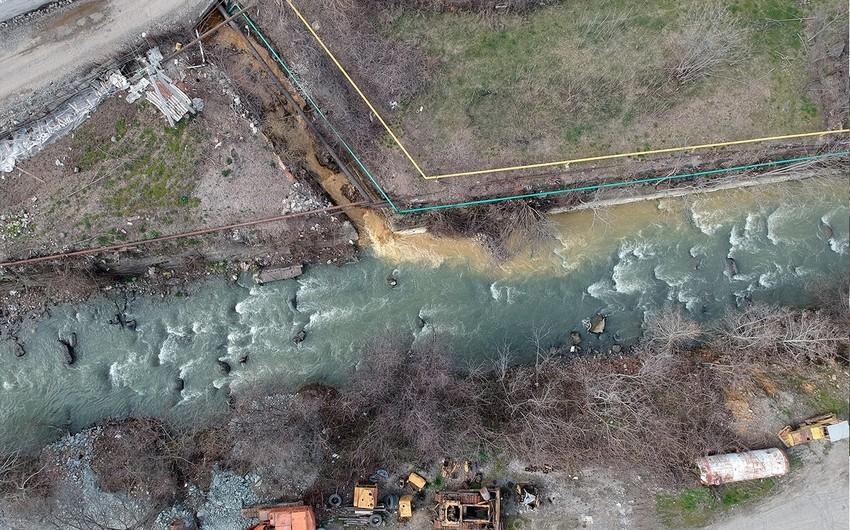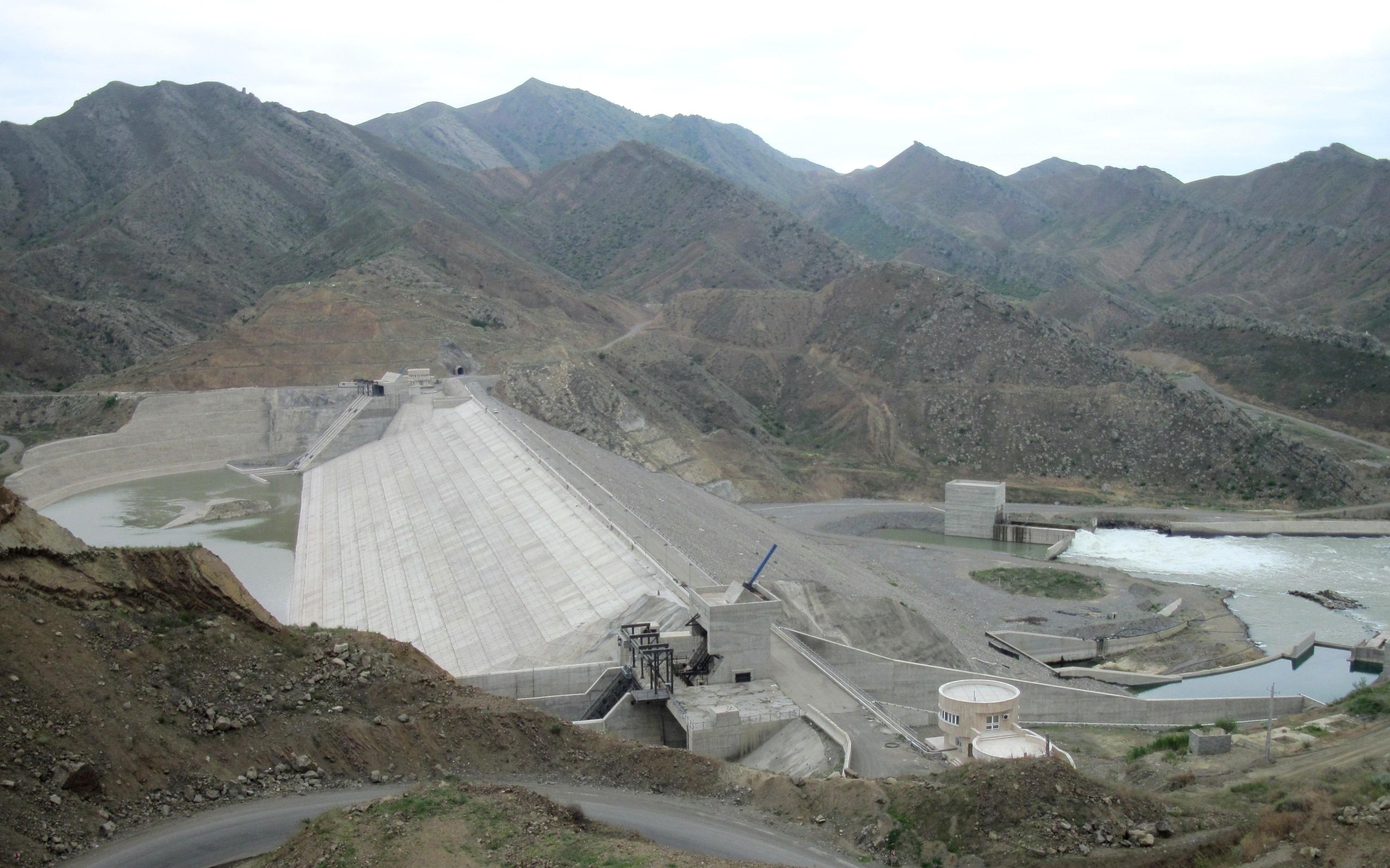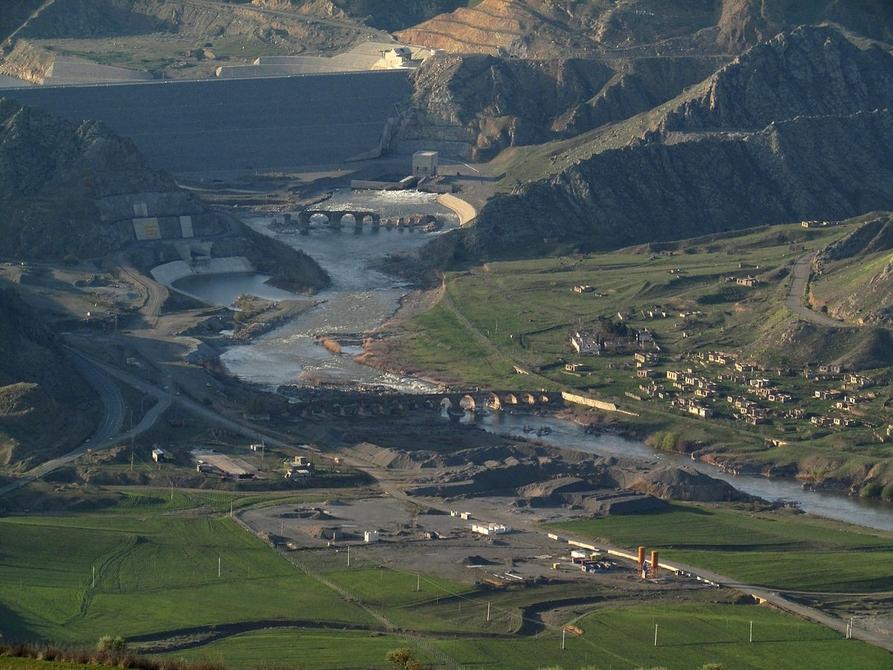Full-scale environmental scourge threatens the transboundary Araz river
Will Iran show the mettle to act?
ANALYTICS 26 August 2022 - 15:26
| Orkhan Amashov Caliber.Az |
Environmental issues, by their very nature, refuse to be viewed from the myopic guise of the "not in my background" principle, as they do not merely impact those in the immediate vicinity of an affected area, but have a deleterious impact on a wide expanse of geographical realms far beyond the point of catastrophe.
The ongoing reckless pollution of the transboundary Araz River by Armenia’s mining industry remains unaddressed. The subject is by no means new, neither is the concern, which has been voiced on countless number of occasions to no avail.
Azerbaijan, on an official level, has long defined this pattern of behaviour as an 'ecological terror'. Iran, no lesser sufferer from Armenian negligence to this effect, has also raised official objections, which have gone unheeded. However, there is a far more consequential role that Tehran, given its warm relations with Yerevan, could play and this mandates proactive involvement in fixing the issue, the unresolved long-term ecological implications of which are too hideous to contemplate.
A fortnight ago, in the light of reports regarding the exacerbated callous contamination of the river being at the forefront of the Azerbaijani media, compounded by numerous news bulletins as to the ‘creative inertia’, of Yerevan, even more, dreadful fears have been sparked. Nothing of consequence has ensued in terms of corresponding measures by either the main culprit or the party that was expected to revitalise its presently lacklustre zeal to spring to action.
Two weeks after, it seems only too timely to reiterate some of the basic essentials pertaining to the ongoing petrifying scourge, throw a retrospective glance and offer a renewed vision as to what the future may hold in store.
Armenia has a proven track record of neglecting environmental standards by letting its mining industry treat the Araz River as a depository for waste and the worst of sludge. The heavy metal release from the enterprises based in Kafan and Kajaran, located in the southern part of the country, together with the discharge of sewage from these districts are key elements of the disastrous environmental situation on the ground. The flow of pollutants from the copper-molybdenum facility in Kajaran to the Okchuchay River and the gold deposit in Agarak to the Kharchevan, both rivers being tributaries of the Araz River, form another aspect of the bigger picture.
Over the years, this callous disregard for the environment has also been supported by egregious foreign companies. For instance, the German enterprise Cronimet is still very active in Armenia's mining industry, having its share in contributing to the life-threateningly high levels of copper, molybdenum, manganese, iron, zinc and chromium in the Okchuchay River.

Present juncture
Although the dire ecological situation caused by Armenia is an ongoing issue, it has assumed a heightened significance due to several developments. After the victory in the Second Karabakh War, Baku resumed its effective control over the entire borders with Iran and Armenia, allowing it to conduct the necessary examination of water samples and to determine the current extent of this calamity.
Over the past three years, Iran has also raised its concerns without being able to achieve anything tangible, despite having good relations with and concomitant leverage with Yerevan. In November 2019, there was an attempt to address the issue through an intergovernmental working group, but nothing eventuated from its labours, which seem to have focused on the articulation of this concern, without going into any detailed practicalities.
In May, Iran's Chief Prosecutor, during his Yerevan sojourn, expounded on the criticality of the disaster and referred to a special joint committee tasked with addressing the matter. Then there was a meeting between the Ecology Ministers of the two countries within the framework of the 'Cooperation for a Better Ecology' conference, which also looked into the situation pertaining to the Araz River.
A few days ago, the head of the East Azerbaijan province of Iran, Abedin Khorram, in his meeting with Armenia's Ambassador to Iran Arsen Avakyan expressed his concerns.
Therefore, given this unfolding environmental crisis, Baku's augmented abilities to conduct its own research, by virtue of the resumption of control along the transboundary river's polluted segments, and increasingly disastrous implications for Iran, which Tehran, for all its desire not to upset relations with Yerevan cannot overlook, it seems the present juncture provides a nearly optimal critical mass for robust actions to be taken.

Unadulterated recalcitrance
Armenia's mode of behaviour is not in conformity with the Convention "On the Protection and the Use of Transboundary Watercourses and International Lakes", otherwise known as the Water Convention, to which Yerevan refused to be a party over the years, unlike Azerbaijan, which ratified it in 2000.
Armenia has repeatedly and obstinately refused to change its practice of sending industrial waste originating in its heavy industry facilities to Okhcuchay and then to the Araz River. It has also failed to install water-treatment mechanisms, despite numerous sensible offers, one being from German Ambassador to Azerbaijan Wolfgang Manning a couple of years ago.
Ecology recognises no boundaries, but its ramifications impact the whole of our shared humanity. Experts in the field have long determined that river pollution is never circumscribed to its immediate locality, with its contaminating impact pervading a wider ecosystem.
Neil Watson, a well-known British journalist, commented: “This ecologically unfriendly approach flies in the face of reason and current international policies. The Armenian authorities and their supporters clearly believe in the "not in my backyard" approach. However, a river represents our collective backyard, and the endangered humanity is our collective future.”
In fact, the pollution of the Araz River is not merely about its impact on drinking water or agriculture, but its devastating implication for fauna and flora and for human health leading to deadly diseases engendered by increased toxicity.

This is not just threatening for Azerbaijan or Iran, but also for the whole South Caucasus and even the Caspian Basin countries if one looks at the disaster's import from the guise of a long-term assessing ecologist. It is imperative that Iran plays an increased role in persuading Armenia to adopt the terms defining the basic environmental standards pertaining to transboundary waters.
The article published in Tehran Times in November 2019 suggested that the joint research conducted between Tabriz University and Iran's Ministry of Agriculture found that the river was polluted with heavy metals and established the presence of a deadly concentration of pollutants. Nevertheless, the information was not revealed to the public for diplomatic reasons.
The question that happens to be of the utmost significance now is whether Iran will rise above its excessive focus on diplomatic niceties and step in a genuinely robust way to address the issue endangering its and the region's eco-security.
As for Baku, three separate courses of actions could be pursued. The first is to encourage Tehran to be proactive in using its leverage vis-a-vis Yerevan. Secondly, it might be judicious to incorporate the dire ecological situation involving the Araz River into the nascent Azerbaijani-Armenian Peace Process, as an auxiliary item. Thirdly, however banal and cliched it may sound, there may also be some sense in further increasing international awareness of this calamity.
The cumulative impact of these concurrent tracks may have a better chance to have a bearing on the state of affairs. Iran must face up to the impact of its environmental decisions and act now, for the greater good of humankind.
Caliber.Az
|
1
|
Iran re-evaluating its ties with Azerbaijan, Armenia Baku - more important, honest partner than Yerevan
25 April 2024 - 12:00
|
|
2
|
"Peoples of South Caucasus should resolve their differences independently" Foreign analysts on Caliber.Az
24 April 2024 - 17:40
|
|
3
|
Mark Rutte seeks Türkiye's backing for new job A new pair of hands
24 April 2024 - 16:55
|
|
4
|
Bilateral relations, regional dynamics, & peacekeepers’ withdrawal Key takeaways from President Aliyev's Moscow visit
24 April 2024 - 14:07
|
|
5
|
Air France plane safely evacuated at Heydar Aliyev Int’l Airport
24 April 2024 - 19:08
|
Türkiye - latest country to launch digital nomad visa
27 April 2024 - 05:04
US National Security Advisor: Defence industry “still underestimating” global need for munitions
27 April 2024 - 03:05
China passes tariff law as tensions with trading partners simmer
27 April 2024 - 01:03
Azerbaijani, German presidents hold expanded meeting
26 April 2024 - 23:50
Azerbaijani President, German Chancellor hold joint press conference
26 April 2024 - 23:45
Mount Fuji view to be blocked as tourists overcrowd popular photo spot
26 April 2024 - 23:00
Türkiye bases its relations with African countries on win-win principle: Parliament speaker
26 April 2024 - 20:53
ICJ concludes public hearings on 'Azerbaijan v. Armenia' case, proceeds to evidence verification
26 April 2024 - 20:45
Turkic parliament committee chairmen tour Khankendi & Shusha in Azerbaijan
26 April 2024 - 20:39
ByteDance prefers TikTok shutdown in US over sale
26 April 2024 - 20:39
Health Ministry: Over 50 Palestinians killed in Gaza as Israeli onslaught continues
26 April 2024 - 20:26
Azerbaijani president meets German FM in Berlin, discusses COP29 & peace agenda
26 April 2024 - 20:22
Russia, Ukraine hand over bodies of dead soldiers
26 April 2024 - 20:11
Political analyst: Armenian leadership hostile towards Russia
26 April 2024 - 19:56
Israeli civilian fatally injured in anti-tank missile strike near Lebanon border
VIDEO26 April 2024 - 19:41
Turkish court sentences Syrian woman to life in prison for bombing in Istanbul in 2022
26 April 2024 - 19:26
Azerbaijani, Kazakh military specialists convene for bilateral co-op discussions
26 April 2024 - 19:16
Armenia, Italy agree on military-technical cooperation
26 April 2024 - 19:11
Kazakhstan hosting meeting of defence ministers of SCO member states
26 April 2024 - 18:56
Azerbaijan, Armenia install 28 markers as border clarification works reach 35% completion
26 April 2024 - 18:50
UK’s ministry: Russian forces accelerating advance west of Ukraine’s Avdiivka
26 April 2024 - 18:41
Kazakh military delegation explores Azerbaijan's defense capabilities during visit
26 April 2024 - 18:35
France, Germany push on with 2040 joint tank project
26 April 2024 - 18:26
Political analyst: Demarcation of border with Azerbaijan meets Armenia’s vital interests
26 April 2024 - 18:11
Palestinian Resistance factions fighting against Israeli forces across besieged Gaza Strip
26 April 2024 - 17:56
US Central Command conducts humanitarian airdrops into Gaza
26 April 2024 - 17:41
Azerbaijan unveils programme of sixth World Forum on Intercultural Dialogue in Baku
26 April 2024 - 17:26
Azerbaijan's energy offer signals path to normalization with Armenia
Amid geopolitical shifts26 April 2024 - 17:24
Spain to send Patriot missiles to Ukraine
26 April 2024 - 17:11
Russia's oil revenues grow despite Western sanctions
Bill of the war26 April 2024 - 17:05
US, China spar over bilateral, global issues
26 April 2024 - 16:56
Kyrgyzstan's school-building gesture in Karabakh signals deeper ties with Azerbaijan
26 April 2024 - 16:41
Armenian PM vows to tackle existential challenges
We will address this issue26 April 2024 - 16:30
Azerbaijani police find explosive devices, ammunition in Khojavend
PHOTO26 April 2024 - 16:28
IAEA: Situation at Zaporizhzhia Nuclear Power Plant remains unpredictable
26 April 2024 - 16:13
US Mojave proves its unmatched versatility in unprecedented live-fire demo
26 April 2024 - 15:58
From energy cooperation to investment expansion
Baku, Budapest forge stronger business ties26 April 2024 - 15:45
Russian operation to seize Chasiv Yar offers most immediate prospects for significant advances
ISW analysts’ opinion26 April 2024 - 15:43
Turkish president to meet with US counterpart at White House in May
26 April 2024 - 15:28
Sweden to move ahead with sending troops to Latvia as part of NATO forces
26 April 2024 - 15:13
